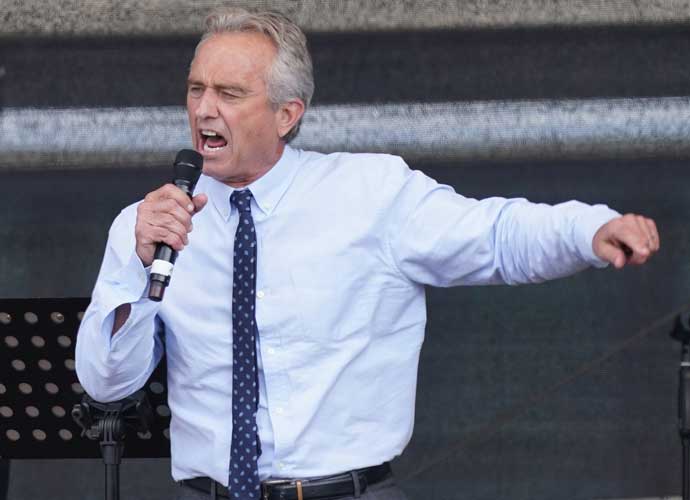

BERLIN, GERMANY - AUGUST 29: Robert F. Kennedy Jr., nephew of former U.S. President John F. Kennedy, speaks to people from a wide spectrum, including coronavirus skeptics, conspiracy enthusiasts, right-wing extremists, religious conservatives, hippies and others gathered under the Victory Column in the city center to hear speeches during a protest against coronavirus-related restrictions and government policy on August 29, 2020 in Berlin, Germany. City authorities had banned the planned protest, citing the flouting of social distancing by participants in a similar march that drew at least 17,000 people a few weeks ago, but a court overturned the ban. (Photo by Sean Gallup/Getty Images)
The Department of Health and Human Services (HHS) Secretary Robert F. Kennedy Jr.’s “Make America Healthy Again” report appears to have utilized artificial intelligence, raising concerns about the study’s credibility.
The report, part of Kennedy’s Make America Healthy Again (MAHA) initiative, scrutinized the state of health and wellness in the United States. Released last week, it called for a reevaluation of the nation’s food supply, vaccine safety and efficiency and the distribution of prescription drugs.
A thorough analysis of the MAHA report revealed that artificial intelligence was used to generate scientific citations, which many have criticized for being “inaccurate” or “sloppy.” The report was marred by numerous citation errors, including broken links, incorrect issue numbers and missing authors in its references.
The report cited hundreds of studies. However, many of the studies did not exist. According to an investigation by NOTUS, at least seven sources were completely nonexistent.
Subscribe to our free weekly newsletter!
A week of political news in your in-box.
We find the news you need to know, so you don't have to.
The formatting error most indicative of AI usage is the inclusion of “oaicite” within several of the URLs referenced. American artificial intelligence company OpenAI often provides the marker “oaicite” through responses generated by its ChatGPT model.
The MAHA report has become increasingly contested amid allegations of reliance on artificial intelligence, with many questioning the credibility of its findings.
“This is not an evidence-based report, and for all practical purposes, it should be junked at this point,” said George C. Benjamin, executive director of the American Public Health Association. “It cannot be used for any policymaking. It cannot even be used for any serious discussion because you can’t believe what’s in it.”
The Department of Health and Human Services denoted the citation miscues as “minor citation and formatting errors.” Shortly after the allegations surfaced, the report was updated to remove mentions of “oaicite” within its references.
White House press secretary Karoline Leavitt argued that, despite erroneous citations, the MAHA report’s revelations about American health remain valid.
In a briefing on the matter, Leavitt told reporters that the report’s issues “does not negate the substance of the report, which, as you know, is one of the most transformative health reports that has ever been released by the federal government.”
Democratic State Senators in New York passed legislation that would permit terminally ill patients to…
President Donald Trump’s mass deportation plans remain vague, particularly regarding the agricultural and hospitality industries,…
During a House committee hearing, Rep. James Comer (R-Kentucky) told Rep. Maxwell Frost (D-Florida) to…
President Donald Trump and Director of National Intelligence (DNI) Tulsi Gabbard are standing on opposite…
After President Donald Trump left the Group of Seven summit early, the other six leaders…
After President Donald Trump said last week that he supported arresting Gov. Gavin Newsom (D)…